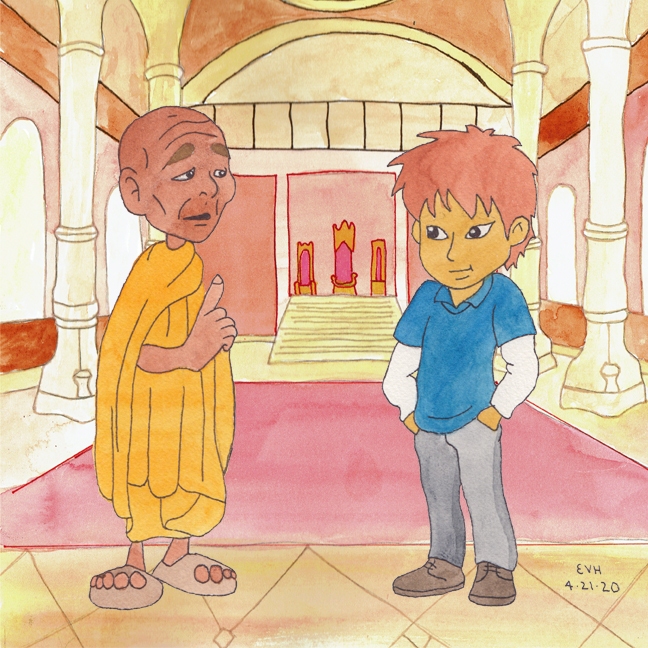
Jataka 246
Telovāda Jātaka
The Lesson
as told by Eric Van Horn
originally translated by William Henry Denham Rouse, Cambridge University
originally edited by Professor Edward Byles Cowell, Cambridge University
This story – once again – takes up the issue of eating meat.
I quote from the Winter 1994 issue of Tricycle Magazine. The article is by Kate Wheeler:
“
According to the Buddha, it is possible to eat meat with a compassionate, pure, and gentle mind. Once, a wealthy donor named Jivaka came to the Buddha to check out a nasty rumor.Venerable Sir, I have heard this: ‘The recluse Gotama knowingly eats meat prepared for him from animals killed for his sake… do those who speak thus say what has been said by the Blessed One, and not misrepresent him?’
The Buddha said he had been misrepresented — he did not eat meat from animals specifically killed for him. Then he described the monk who lives “pervading the all-encompassing world with a mind imbued with loving-kindness” and is invited to accept a meal. That monk eats the almsfood “without being tied to it, infatuated with it, and utterly committed to it, seeing the danger in it and understanding the escape from it. What do you think, Jivaka? Would that (monk)… choose for his own affliction, or for another’s affliction, or for the affliction of both?” Jivaka says no. The Buddha goes on to describe his own mind, in which cruelty of any kind was no longer a possibility. “Any delusion whereby cruelty or discontent or aversion might arise has been cut off.”
From this story, it seems that the Buddha must have eaten meat. He did so without cruelty toward animals, without anger and judgment toward those who offered the meat to him.
”
This sets up the curious situation today where lay people are often vegetarians, but monks and nuns are not. But the issue for a monk or nun is that to refuse an offering of any kind is the worst kind of rebuke toward a lay person. The lay person makes the offering from a heart of generosity, albeit from a mind of ignorance. The monk or nun accepts the generosity while recognizing the defilement in the lay person.
“The wicked kills.” The Master told this is a story while he was staying in his gabled chamber near (the city of) Vesāli. It is about Sīhasenāpati.
It is said that this man, after he had gone to the monastery, offered hospitality and then gave food with meat in it. On hearing this, the naked ascetics (rival sects) were angry and displeased. They wanted to discredit the Buddha. “The priest Gotama,” they sneered, “with his eyes open, eats meat prepared for him on purpose.”
The monastics discussed this matter in their Dharma Hall. “Friend, Nāthaputta the Ascetic goes about sneering because, he says, ‘Priest Gotama eats meat prepared for him on purpose. He does this with his eyes open’.” (Nathaputta was probably a member of the rival Jain sect.) Hearing this, the Master responded, “This is not the first time, brothers and sisters, that Nāthaputta has sneered at me for eating meat which was prepared for me on purpose. He did the same thing in former times. And he told them this story from the past.
Once on a time, when Brahmadatta was the King of Benares, the Bodhisatta was born into a brahmin family. When he came of age he embraced the holy life.
One day he went down from his dwelling in the Himalaya Mountains to get salt and seasoning. On the next day he went into the city and begged for alms food. A certain wealthy man decided to annoy the recluse. So he brought him to his home, pointed out a seat, and then served him fish. After the meal, the man sat on one side and said, “This food was prepared specifically for you by killing living creatures. This wrong is on your head, not mine!” And he repeated the first stanza:
“The wicked kills and cooks and gives to eat,
He is defiled with harm that takes such meat.”
On hearing this, the Bodhisatta recited the second stanza:
“The wicked may for naught kill wife or son,
Yet, if the holy eat, no harm is done.”
And with these words of instruction the Bodhisatta rose from his seat and departed.

Figure: Teaching a Lesson
This discourse ended, the Master identified the birth, “Nāthaputta, the naked ascetic, was this wealthy man, and I was the recluse.”
